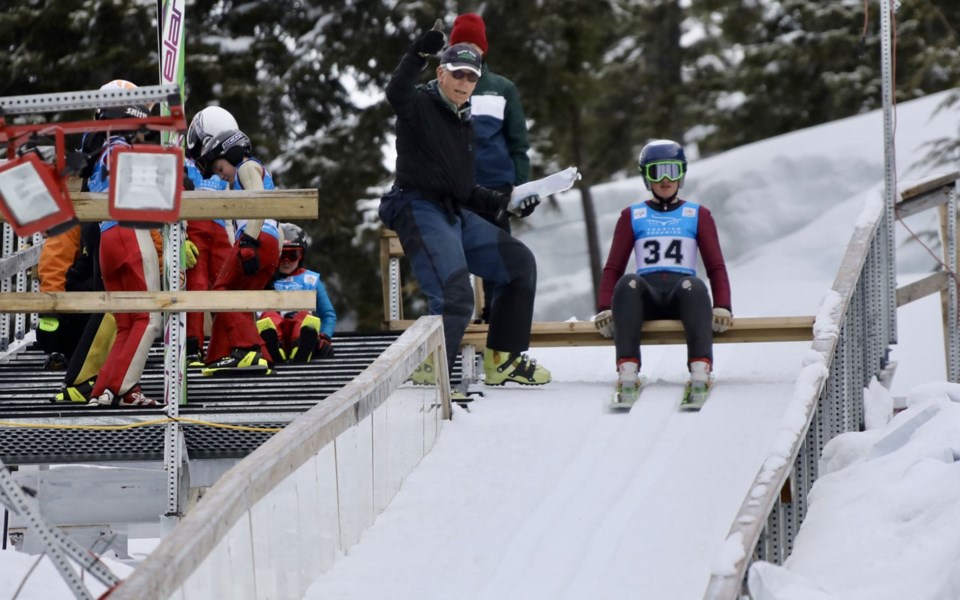In a country dominated by winter sports that take place in rinks or on mountains, ski jumping rarely captures the country's attention. But every four years, it has its moment in the spotlight.
"We see an uptake (in participation) every Olympics," said Ski Jumping Canada chair Todd Stretch.
But when Vancouver hosted the Winter Olympic Games in 2010, despite having a brand-new ski jump facility in the Callaghan Valley, local proponents of the sport weren't able to capitalize on that exposure due to a lack of smaller training facilities for young athletes.
"Jumping, you know, there was a lot of attention and interest but we had no actual way to introduce kids to the sport because they just can't start on those two large jumps," explained John Heilig, a board member with the Sea to Sky Nordics Ski Club who formerly served as sport manager for ski jumping and Nordic combined for the Vancouver Organizing Committee and sport manager at Whistler Olympic Park.
A lack of facilities is no longer a problem, as Whistler Sport Legacies (WSL) built both 20- and 40-metre training jumps far better suited to younger skiers at Whistler Olympic Park three seasons ago. Sea To Sky Nordics is also now home to an eight-metre summer jumping facility in Squamish. As Heilig explains, the two training facilities and associated programs have "changed the landscape for the sport regionally."
Now, as the Calgary 2026 Bid Corporation continues to work towards submitting an Olympic bid that would see the ski jumping and Nordic combined events once again take place in Whistler Olympic Park, local clubs are hoping that the extra attention, coupled with the now-existing training facilities, can help further the development of the sports in the Sea to Sky corridor and beyond.
Holding Olympic events in Whistler "would have a huge impact, at least on exposure to the sport," Heilig explained. "Now we're actually able to do something about that exposure, whereas in the past we weren't able to ... This sport has a lot to offer but you need to have the facilities in place."
Because hosting the ski-jumping events in Whistler would cost millions less than it would to rebuild Alberta's ski-jump facilities, Heilig said he hopes the money saved by a successful Calgary bid would result in more resources being put into improving "the much less expensive, smaller facilities and actually get a lot more kids ski jumping."
If Calgary wins the bid, "with operating the jumps in Whistler, there would be a renewed focus on assisting Vancouver and B.C. to develop their ski-jumping program," agreed Stretch. Hosting the events likely mean updated resources for local venues as well, namely a much-needed plastic jump surface for year-round jumping, Stretch added.
The installation of summer jumping surfaces would allow athletes to get the requisite 600—or more—jumps each summer, Heilig said.
"I would hope there'd be a thought to, 'Here, if we're going to have the Games, what do we do to create opportunities for local kids to participate?'" he said. "Even at this point in time, if kids signed up this year or next year, there's potential, especially for girls, that they could even ski in the 2026 Games. That's a bit of a stretch, but it's possible."
Currently, hundreds of kids are exposed to ski jumping in the Sea to Sky through multi-sport camps each year, while about 12 to 16 youth are committed to the sport and jumping regularly. Sea to Sky Nordics' short-term goal is to build that current group into a cohort of 30 to 50 Nordic jumping athletes, Heilig added.
The problem with trying to grow those sports in Whistler, explained WSL president and CEO Roger Soane, is that the two disciplines can be a difficult sell in a resort where other, more popular recreation opportunities are endless.
"Unfortunately, the two events that they're looking at are possibly the smallest athlete pool in Canada," he said. "Ski jumping and Nordic combined; they're very niche sports."
Though Heilig admits that the club is "still trying to figure out how to engage (Whistler's) community" in these early stages, in his view, "in a few years we're going to have some excellent local ski jumpers."
Those interested in ski jumping or Nordic combined can contact Sea to Sky Nordics at [email protected], while those interested in the Hoppers ski jumping program this winter can contact Whistler Olympic Park at 604-964-0060 ext. 2460.




